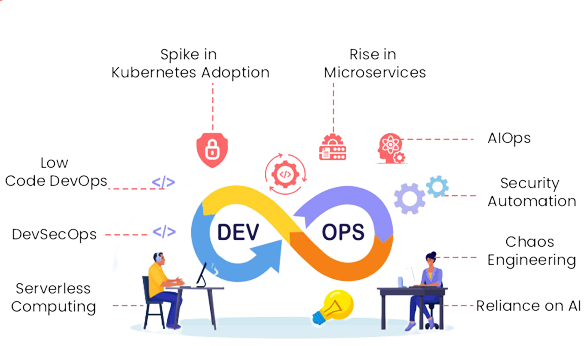DevOps is a rapidly evolving field that is poised for significant growth and innovation in the coming years. As organizations continue to adopt DevOps practices, we can expect to see an increased focus on automation, collaboration, security, and the adoption of emerging technologies.
As software development continues to evolve, so does the role of DevOps in the software development lifecycle. DevOps is a collaborative approach to software development that emphasizes communication, integration, and automation. This approach has become increasingly popular over the years, as it enables organizations to deliver software faster, more reliably, and with greater efficiency.
In this blog post, we will explore the future of DevOps and discuss the predictions and trends for 2023 and beyond.

The Rise of AIOps
-
What is AIOps?
AIOps is the application of artificial intelligence and machine learning techniques to automate and optimize IT operations. In the context of DevOps, AIOps can help automate tasks such as monitoring, testing, and deployment, enabling organizations to deliver software faster and with greater efficiency.
-
Benefits of AIOps in DevOps
The benefits of AIOps are numerous. By automating tasks and providing real-time insights, AIOps can help improve the speed and accuracy of software delivery, reduce downtime, and improve overall system performance.
-
Predictions for AIOps in DevOps
In the coming years, we can expect to see increased adoption of AIOps in it. As organizations look for ways to streamline their software development processes and improve their bottom line, the benefits of AIOps will become increasingly apparent.
Increased Focus on Security
-
Importance of security in DevOps
As software becomes increasingly complex and distributed, security is becoming an increasingly important concern for these teams. Security breaches can have serious consequences, both in terms of financial losses and damage to an organization’s reputation.
-
Challenges of implementing security in DevOps
Implementing security in DevOps can be challenging, as security considerations can often be at odds with the need to deliver software quickly. However, by adopting a security-first mindset and implementing security measures throughout the software development lifecycle, organizations can improve the security of their software without sacrificing speed or efficiency.
-
Predictions for security in DevOps
In the future, we can expect to see a greater emphasis on security in DevOps. As cyber threats continue to evolve and become more sophisticated, organizations will need to take a proactive approach to security to protect their software and data.
Adoption of Cloud-Native DevOps
-
What is cloud-native DevOps?
This is an approach to software development that leverages cloud-native technologies such as containers, microservices, and serverless computing. By building software that is designed to run in the cloud, organizations can take advantage of the scalability, reliability, and cost savings offered by cloud computing.
-
Benefits of cloud-native DevOps
The benefits of cloud-native DevOps are numerous. First and foremost, it allows for faster development and deployment of software, as developers can quickly spin up and tear down cloud-based resources as needed. Additionally, it enables greater scalability, as resources can be easily scaled up or down in response to changing demand. It also improves reliability, as cloud-native applications are designed to be highly available and fault-tolerant.
-
Challenges of cloud-native DevOps
While the benefits of cloud-native DevOps are clear, there are also some challenges associated with this approach. One of the biggest challenges is the need for specialized skills and expertise in cloud-native technologies such as containers, Kubernetes, and serverless computing. Additionally, organizations may need to invest in new tools and infrastructure to support cloud-native DevOps.
Future Trends in DevOps
-
Increased automation
One of the biggest trends is the increasing adoption of automation tools and technologies. By automating routine tasks such as testing, deployment, and monitoring, teams can free up time and resources to focus on more strategic initiatives.
-
Greater collaboration
It is all about collaboration between different teams and stakeholders. In the future, we can expect to see even greater collaboration between developers, operations teams, security professionals, and business stakeholders.
-
Integration with emerging technologies
Finally, we can expect to see it continue to evolve and integrate with emerging technologies such as AI, ML, and the Internet of Things (IoT). As these technologies become more mainstream, they will present new opportunities for these teams to improve the speed, agility, and efficiency of software development and delivery.
Conclusion
DevOps is a rapidly evolving field that is poised for significant growth and innovation in the coming years. As organizations continue to adopt their practices, we can expect to see an increased focus on automation, collaboration, security, and the adoption of emerging technologies. By embracing these trends and staying up-to-date with the latest tools and technologies. These teams can help their organizations achieve faster time-to-market, greater agility, and improved business outcomes.
BACK










